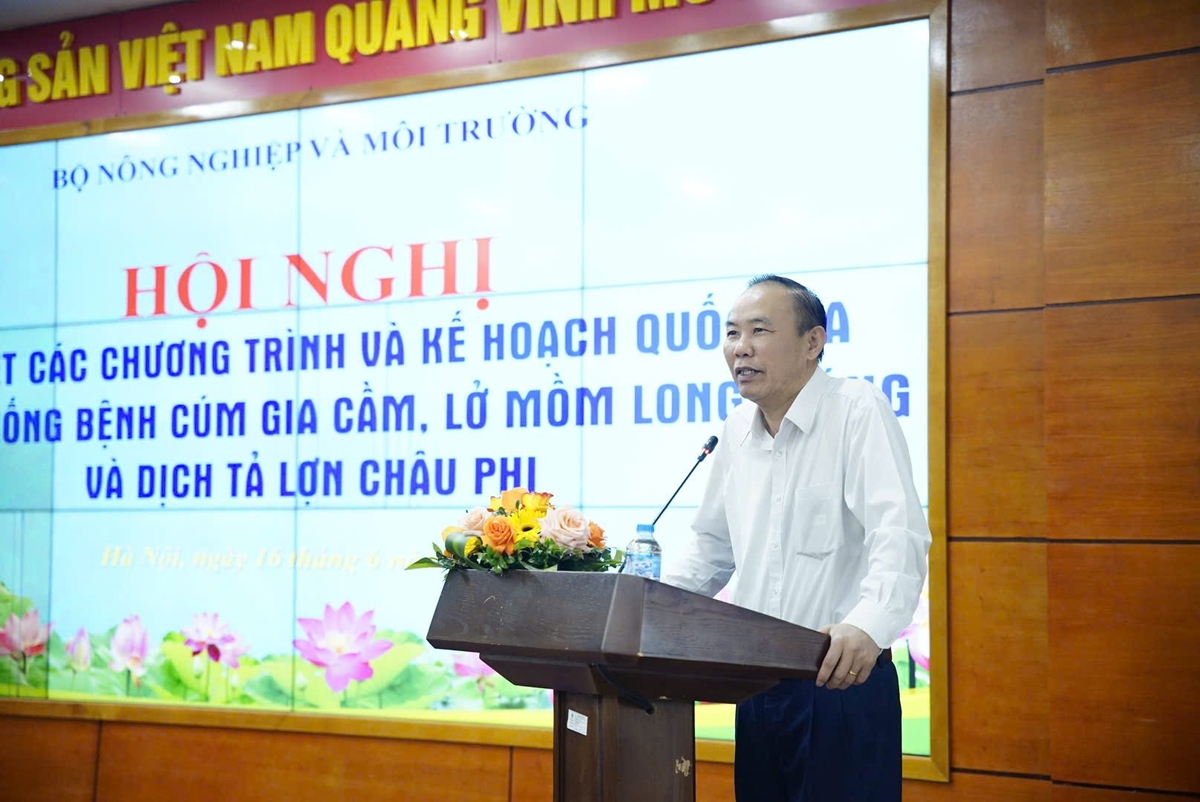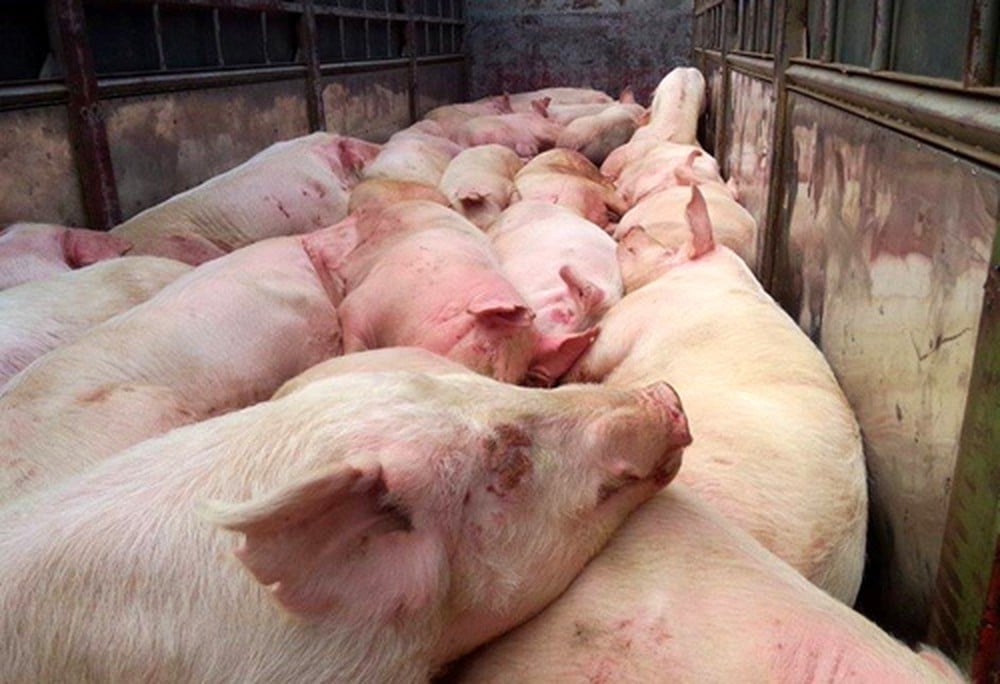December 22, 2025 | 03:37 GMT +7
December 22, 2025 | 03:37 GMT +7
Hotline: 0913.378.918
December 22, 2025 | 03:37 GMT +7
Hotline: 0913.378.918
Deputy Minister of Agriculture and Environment Phung Duc Tien stated at the national review conference on the prevention and control of avian influenza (AI), foot-and-mouth disease (FMD), and African swine fever (ASF) on June 16 that national programs and plans had achieved substantial results after five years of implementation. They have not only successfully contained hazardous animal diseases but have also promoted a significant change in awareness and practices across the system, from local governments and veterinary agencies to individual livestock producers.
However, the implementation process has revealed systemic shortcomings. Following administrative restructuring at the district level, many current regulations and circulars have become outdated and incompatible with the new management framework. The Deputy Minister emphasized the need to revise and review these legal documents in a timely manner, cautioning that any changes must address fundamental issues rather than being superficial or fragmented. Additionally, he advocated for a decentralization strategy that is specific and allows local authorities to operate with increased autonomy, accountability, and adaptability in the prevention and control of diseases.
The inconsistency in vaccination practices across localities was one of the main bottlenecks determined. "It is intolerable that the vaccination of animals or their non-vaccination makes no difference", cautioned Deputy Minister Tien. He reiterated that vaccines are not merely a technical recommendation—they are a mandatory shield to protect livestock herds, sustain production, and preserve the reputation of Vietnam’s livestock industry. In practice, vaccinations, however, are primarily symbolic in numerous regions due to low coverage, poor oversight, and weak enforcement. Such lax practices undermine national programs and risk widespread outbreaks of serious diseases.

Deputy Minister of Agriculture and Environment Phung Duc Tien speaking at the Conference. Photo: Linh Linh.
The veterinary sector has made significant progress in the realm of scientific and technological advancements, including the development of recombinant ASF vaccines and the sequencing of novel virus strains. Nevertheless, the Deputy Minister emphasized the need for increased investment in domestic vaccine production, diagnostics, early warning mechanisms, and surveillance systems. Given infrastructure limitations, he advocated for greater involvement of private service providers in areas like testing, licensing, and vaccine management. He warned that preserving a monopoly model only serves to create opportunities for corruption, and emphasized the importance of rigorous, transparent quality control with independent supervision.
Additionally, the issue of food safety and slaughtering practices has become increasingly urgent. The Deputy Minister highlighted a rise in small-scale, unregulated slaughtering activities, while food safety inspections remain inadequate or are even neglected in certain localities. Several violations have been identified, such as the illegal circulation in the market, improper quarantine stamps, and undocumented pork and poultry feet. These concerns endanger public health and undermine public confidence in the veterinary control system. Therefore, in order to prevent food safety from becoming a "blind spot" in the entire production chain, it is imperative to enhance surveillance, inspection, and penalties for violations..
The Deputy Minister advocated for a more precise definition of roles and responsibilities at all levels, with a particular emphasis on provincial and district veterinary officers, in relation to the organizational structure. He observed that "many officials still lack clarity and fail to comprehend the significance of disease prevention and vaccination". He proposed the implementation of improved communication, training, and capacity-building programs for grassroots staff in order to transform awareness into systematic and compliant action.

Leaders of the Ministry of Agriculture and Environment pointed out that small-scale slaughtering is increasing, while food safety control has not kept up, and is even lax in some localities. Photo: VGP.
The Deputy Minister of Agriculture and Environment of Vietnam has encouraged businesses to adopt a more proactive approach in establishing sector-specific standards, investing in domestic vaccine development, and piloting practical models to reduce costs and improve accessibility for producers as the livestock industry in Vietnam transitions toward modernization. He emphasized that enterprises must not remain passive observers; they must be involved in the process from research and testing to communication and real-world application.
Summing up the five-year period, Deputy Minister Tien praised the strong alignment and commitment from central to local levels, from regulatory bodies to the farming community and the business sector. However, he cautioned against complacency, referencing unresolved challenges such as the fact that small-scale farming still accounts for 50% of the sector, poor technical infrastructure, ineffective control of antibiotics and prohibited substances, and complex cross-border smuggling. He warned that Vietnam's livestock industry would struggle to advance to a more prominent position on the global agricultural landscape without comprehensive solutions.
In his concluding remarks, Deputy Minister Phung Duc Tien emphasized the necessity of establishing a comprehensive and robust disease prevention system to enable Vietnam's livestock sector to access high-end markets and become deeply integrated into the global value chain. The sector can only be a sustainable pillar of the national agricultural economy by establishing a secure, transparent, and resilient livestock ecosystem.
Translated by Linh Linh

(VAN) As Viet Nam enters a new era, the national agricultural sector must proactively adapt to global trends to transform current challenges into strategic development opportunities.
/2025/12/18/5046-3-154320_307.jpg)
(VAN) Granting planting area codes is a solution that helps Lao Cai manage forests effectively while also laying a data foundation to support the development of the carbon credit market in the future.
/2025/12/16/3554-1-192458_116.jpg)
(VAN) Minister Tran Duc Thang held a working session with the Viet Nam Seaculture Association to discuss solutions for developing marine farming in a methodical, industrial, sustainable, and well-organized manner.

(VAN) Trading forest carbon credits is to reduce greenhouse gas emissions while creating sustainable livelihoods for local communities.

(VAN) Expanding the area of forests with FSC certification creates a foundation for elevating the economic value of forests, promoting sustainable management, and offering opportunities to participate in the carbon credit market.

(VAN) MAE and GIZ organized the conference to strengthening capacity and readiness for EUDR implementation in Vietnam.

(VAN) When women, men, children, and people with disabilities all have the opportunity to maximize their potential, the economy will grow, and the country will prosper.